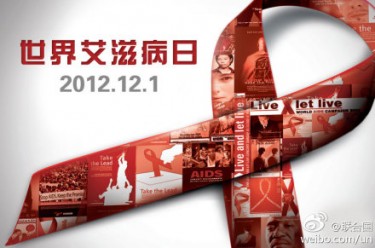An HIV carrier in Tianjin was forced to conceal his condition in order to receive lung cancer surgery [1]. Once incident was brought into the spotlight by Li Hu [2], an HIV/AIDS advocate, during the week of World AIDS Day, it generated sensational responses in China and immediately captured attention of the incoming Chinese leadership.
On Nov 26, 2012 at a State Council commission, Li Keqiang [3], China’s newly nominated premier, called for greater effort in tackling HIV/AIDS. Li also met with non-governmental groups and pledged tax breaks for those NGOs that specialize in HIV/AIDS work.
Lip service or concrete policy?
 [4]
[4]. The United Nations put this poster up on December 1, World's AIDS day on its Chinese micro-blog.
Peng Liyuan [5], the wife of China’s expected next president, Xi Jinping [6], has also dedicated years to advocating the control of HIV and has been appointed the Goodwill Ambassador for Tuberculosis and HIV/AIDS. Although many grassroots NGOs and activists reacted positively to the incoming leadership’s proactive attitude in AIDS outreach, some still cast doubt on the credibility and capability of the government. In fact, the efficiency of Li Keqiang himself is challenged after the exposure of his biggest career blemish [7] [zh]: when Li was the governor in Henan Province in the late 1990s, he tried to cover up a massive HIV outbreak, which stemmed from a tainted government-backed blood donation program.
AIDS and environmental activist Hu Jia [8], who had been sentenced to 3.5 years imprisonment for his advocacy work in 2008, believes the Chinese government is just paying lip service on World AIDS Day [zh]:
@hu_jia [9] 在中国,每年只有12月1日属于艾滋病患者,政府也每到此日大张旗鼓地作秀。李克强作为曾经的河南省委书记,对封锁艾滋病疫情和打压患者、NGO成员负有直接责任。他现在兼任国务院防治艾滋病办公室主任,单是简单如落实一项艾滋病家庭受影响儿童的养育补助,都数年解决不了。
@hu_jia [9] In China, only the day of December 1 belongs to HIV patients. Government officials make a big deal and showcase themselves on this particular day, every year. Li Keqiang assumes the direct responsibility of covering up an HIV/AIDS epidemic and clamping down on HIV/AIDS patients. For years, as the chair of the State Council AIDS working Committee Office, Li has even failed to provide subsidies to HIV-affected children.
A system for AIDS NGOs to grow
The China Daily reports [10] [zh] that there are currently about 1,000 groups in China dedicated to combating HIV/AIDS, but a majority of them were unregistered and work outside the law. Since these NGOs are unable to take benefits from the government, most rely on donations, mainly from overseas. However, the development of the NGO sector calls for a comprehensive system. That's why some netizens felt rather disappointed by the empty gesture [zh]:
@鹅湖龙少 [11]:用得着去表态?建立机制才是你的工作!
@鹅湖龙少 [11]: To set up a system is your job! Why bother with just taking a stand?
Experienced AIDS activist Wan Yanhai [12], who fled to the U.S. on May 2010 out of fear of political prosecution, pointed out:
@万延海2012 [13] 要形成机制。从个人角度,要成为生活方式一部分。从经济角度,要建立市场机制。从政府角度,需要有预算和监督机制。从学校、媒体、场所,需要落实法律规定的义务,承担艾滋病预防的责任。运动式,宣教式,意义不会长久。
@万延海2012 [13] It is necessary to establish a system. Individuals need a system that they can incorporate into their lifestyle. Market demand has to set up the system and the government has to allocate a budget and establish a monitoring mechanism. Schools and the media should implement the obligations prescribed by law and shoulder the responsibility of HIV/AIDS prevention. Only words and petitions will not go far.
Anti-AIDS discrimination policy and education needed
According to a Xinhua report [14] [zh], as of last year, China had 346,000 registered HIV carriers and AIDS patients, although the actual number is estimated to be 780,000. However, due to systemic flaws, HIV/AIDS patients often encounter rejections from doctors. Most the doctors use specialized hospitals as an excuses and shift their responsibilities of HIV/AIDS patients to them. However, more often than not, the specialized hospitals lack the capability of performing major surgeries. Meanwhile, doctors’ safety cannot be guaranteed as no criteria has been established on preventive measures. Apart from the development of the NGO sector, many believe that an anti-discrimination policy and education is needed [zh]:
@ [11]孟林de小屋 [15]:艾滋病防治,除了要解决手术拒诊等医疗歧视及草根NGO合法注册等问题外,接下来更要向制度性歧视开炮。例如《公务员录用体检通用标准》规定艾滋病不合格,这不是政府歧视艾滋病的具体表现又是什么呢?你政府带头歧视,普通大众能不歧视吗?所以,反歧视要向制度层面纵深,要从根上消除艾滋病歧视。
@ [11]孟林de小屋 [15] HIV/AIDS prevention is not only about medical discrimination including the surgery refusal. The next step is to fight against institutional discrimination. Many HIV/AIDS patients are discriminated against when finding employment, the “Civil Servants Employed Medical Standards” for example, barred HIV/AIDS patients from government jobs. Isn't that the embodiment of discrimination against HIV/AIDS carriers from the government? How can the public get rid of this discrimination if the government takes the lead? An anti-discrimination policy for HIV/AIDS carriers has to go much deeper.
@艾滋病人肖剑-大悲咒 [16]:体制问题是形式,根本是歧视的社会问题,而这源于知识的匮乏,从某种程度上来讲,政府和媒体需要为目前出现的问题承担主要责任,因为正是政府的恐吓式宣传,才加剧了社会对艾滋病的恐惧,让无知的人变得更愚昧无知,这种中国式的宣传方式已经用了几千年了,也失败了几千年了。
@艾滋病人肖剑-大悲咒 [16]: The problem concerning the mechanism is merely a matter of form. The heart and core of the problem is social discrimination that stems from the lack of awareness. To some extent, the government and the media have to assume the major responsibility for the current problem. It is the threatening propaganda from the government that intensifies fear in society and benighted ignorant people. This kind of Chinese-style propaganda has been used for thousand of years and has failed for thousands of years.
@数码-兔子 [17]:主要是人们给艾滋病戴上了道德的枷锁,认为得这个病的人是生活不检点,其道德影响远大于病痛本身。特别是在我国道德是一种杀人手段。
@数码-兔子 [17]: The HIV/AIDS debate is wrapped in moral terms. HIV-positive patients are considered to have sexual indiscretions.The morality imposed on these patients is even painful than the infection itself. High moral standards is capable of destroying a person, especially in China.